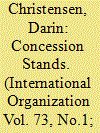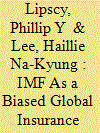|
|
|
Sort Order |
|
|
|
Items / Page
|
|
|
|
|
|
|
| Srl | Item |
| 1 |
ID:
165159


|
|
|
|
|
| Summary/Abstract |
Foreign investment in Africa's mineral resources has increased dramatically. This paper addresses three questions raised by this trend: do commercial mining investments increase the likelihood of social or armed conflict? If so, when are these disputes most prevalent? And, finally, what mechanisms help explain these conflicts? I show, first, that mining has contrasting effects on social and armed conflict: while the probability of protests or riots increases (roughly doubling) after mining starts, there is no increase in rebel activity. Second, I show that the probability of social conflict rises with plausibly exogenous increases in world commodity prices. Finally, I compile additional geo-spatial and survey data to explore potential mechanisms, including reporting bias, environmental harm, in-migration, inequality, and governance. Finding little evidence consistent with these accounts, I develop an explanation related to incomplete information—a common cause of conflict in industrial and international relations. This mechanism rationalizes why mining induces protest, why these conflicts are exacerbated by rising prices, and why transparency dampens the relationship between prices and protest.
|
|
|
|
|
|
|
|
|
|
|
|
|
|
|
|
| 2 |
ID:
165158


|
|
|
|
|
| Summary/Abstract |
A large literature has established that the International Monetary Fund (IMF) is heavily politicized. We argue that this politicization has important consequences for international reserve accumulation and financial crises. The IMF generates moral hazard asymmetrically, reducing the expected costs of risky lending and policies for states that are politically influential vis-à-vis the institution. Using a panel data set covering 1980 to 2010, we show that proxies for political influence over the IMF are associated with outcomes indicative of moral hazard: lower international reserves and more frequent financial crises. We support our causal claims by applying the synthetic control method to Taiwan, which was expelled from the IMF in 1980. Consistent with our predictions, Taiwan's expulsion led to a sharp increase in precautionary international reserves and exceptionally conservative financial policies.
|
|
|
|
|
|
|
|
|
|
|
|
|
|
|
|
| 3 |
ID:
165157


|
|
|
|
|
| Summary/Abstract |
States with large markets routinely compete with one another to shield domestic regulatory policies from global pressure, export their rules to other jurisdictions, and provide their firms with competitive advantages. Most arguments about market power tend to operationalize the concept in economic terms. In this paper, we argue that a state's ability to leverage or block these adjustment pressures is not only conditioned by their relative economic position but also by the political institutions that govern their markets. Specifically, we expect that where a state chooses to draw jurisdictional boundaries over markets directly shapes its global influence. When a state expands its jurisdiction, harmonizing rules across otherwise distinct subnational or national markets, for example, it can curtail a rival's authority. We test the theory by assessing how changes in internal governance within the European Union altered firm behavior in response to US extraterritorial pressure. Empirically, we examine foreign firm delisting decisions from US stock markets after the adoption of the Sarbanes–Oxley accounting legislation. The act, which included an exogenous compliance shock, follows the harmonization of stock market governance across various European jurisdictions. Econometric analysis of firm-level data illustrates that EU-based companies, which benefited from jurisdictional expansion, were substantially more likely to leave the American market and avoid adjustment pressures. Our findings contribute to debates on the role of political institutions in economic statecraft and suggest the conditions under which future regulatory conflicts will arise between status quo and rising economic powers.
|
|
|
|
|
|
|
|
|
|
|
|
|
|
|
|
| 4 |
ID:
165160


|
|
|
|
|
| Summary/Abstract |
Are UN peacekeepers effective in protecting civilians from violence? Existing studies examine this issue at the country level, thereby making it difficult to isolate the effect of peacekeepers and to assess the actual mechanism at work. We provide the first comprehensive evaluation of UN peacekeeping success in protecting civilians at the subnational level. We argue that peacekeepers through their sizable local presence can increase the political and military costs for warring actors to engage in civilian targeting. Since peacekeepers’ access to civilian populations rests on government consent, peacekeepers will primarily be effective in imposing these costs on rebel groups, but less so for government actors. To test these conjectures we combine new monthly data on the location of peacekeepers with data on the location and timing of civilian killings in Africa. Our findings suggest that local peacekeeping presence enhances the effectiveness of civilian protection against rebel abuse, but that UN peacekeeping struggles to protect civilians from government forces.
|
|
|
|
|
|
|
|
|
|
|
|
|
|
|
|
| 5 |
ID:
165163


|
|
|
|
|
| Summary/Abstract |
In the past few years the Western world has witnessed a rise in the popularity of right-wing political discourse promoting nationalistic and exclusionary world views. While in many countries such rhetoric has surfaced in mainstream politics only recently, in Israel, right-wing ideology has been popular for almost two decades. Explanations for this phenomenon focus on Israeli citizens’ attitudinal change in the face of exposure to terrorism but largely do not account for why such ideas remain popular over the long term, even after violence subsides. In this study I examine whether the long-lasting prominence of right-wing nationalistic politics in Israel is linked to the perpetuation of right-wing ideology in popular media. Analyzing the content of more than 70,000 published books, I find that content related to the political right has increased in Israeli books after periods of terrorism, a change that has become more pronounced over the years.
|
|
|
|
|
|
|
|
|
|
|
|
|
|
|
|
| 6 |
ID:
165164


|
|
|
|
|
| Summary/Abstract |
We present a two-stage approach to civil conflict analysis. Unlike conventional approaches that focus only on armed conflict and treat all other cases as “at peace,” we first distinguish cases with and without contested incompatibilities (Stage 1) and then whether or not contested incompatibilities escalate to armed conflict (Stage 2). This allows us to analyze factors that relate to conflict origination (onset of incompatibilities) and factors that predict conflict militarization (onset of armed violence). Using new data on incompatibilities and armed conflict, we replicate and extend three prior studies of violent civil conflict, reformulated as a two-stage process, considering different estimation procedures and potential selection problems. We find that the group-based horizontal political inequalities highlighted in research on violent civil conflict clearly relate to conflict origination but have no clear association with militarization, whereas other features emphasized as shaping the risk of civil war, such as refugee flows and soft state power, predict militarization but not incompatibilities. A two-stage approach to conflict analysis can help advance theories of civil conflict, assess alternative mechanisms through which explanatory variables are thought to influence conflict, and guide new data-collection efforts.
|
|
|
|
|
|
|
|
|
|
|
|
|
|
|
|
| 7 |
ID:
165161


|
|
|
|
|
| Summary/Abstract |
Why do armies sometimes surrender to the enemy and sometimes fight to the bitter end? Existing research has highlighted the importance of battlefield resolve for the onset, conduct, and outcome of war, but has left these life-and-death decisions mostly unexplained. We know little about why battle-level surrender occurs, and why it stops. In this paper, we argue that surrender emerges from a collective-action problem: success in battle requires that soldiers choose to fight as a unit rather than flee, but individual decisions to fight depend on whether soldiers expect their comrades to do the same. Surrender becomes contagious across battles because soldiers take cues from what other soldiers did when they were in a similar position. Where no recent precedent exists, mass surrender is unlikely. We find empirical support for this claim using a new data set of conventional battles in all interstate wars from 1939 to 2011. These findings advance our understanding of battlefield resolve, with broader implications for the design of political-military institutions and decisions to initiate, continue, and terminate war.
|
|
|
|
|
|
|
|
|
|
|
|
|
|
|
|
| 8 |
ID:
165162


|
|
|
|
|
| Summary/Abstract |
Bureaucracies with field operations that cannot be easily supervised and monitored by managers are caught between two sources of dysfunction that may harm performance. The first source of dysfunction is straightforward: field workers can use operating slack and asymmetric information to their own advantage, thwarting an organization's objectives. The second source of dysfunction is often overlooked: attempts to limit workers’ autonomy may have deleterious effects, curbing agents’ ability to respond efficaciously to the environment. I find that the parliaments and executive boards to whom International Development Organizations (IDOs) are accountable differentially constrain IDO organizational autonomy, which in turn affects management's control of field agents. Tight management control of field agents has negative effects, particularly in more unpredictable environments. Attempts by politicians to constrain organizations in an effort to improve performance can sometimes be self-undermining, having net effects opposite those intended.
|
|
|
|
|
|
|
|
|
|
|
|
|
|
|
|
|
|
|
|
|